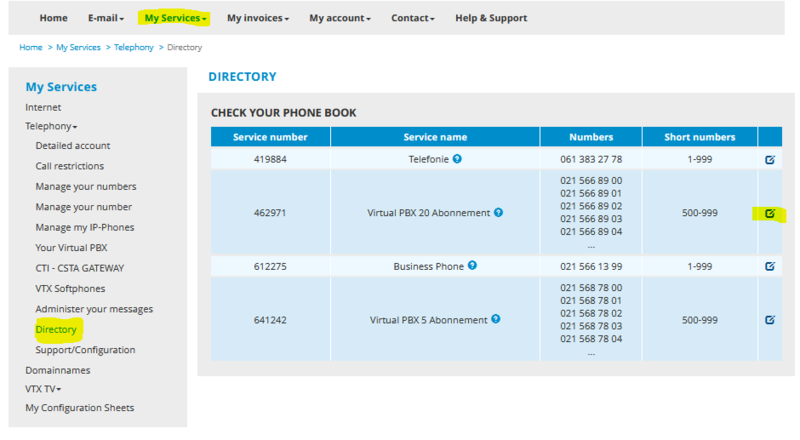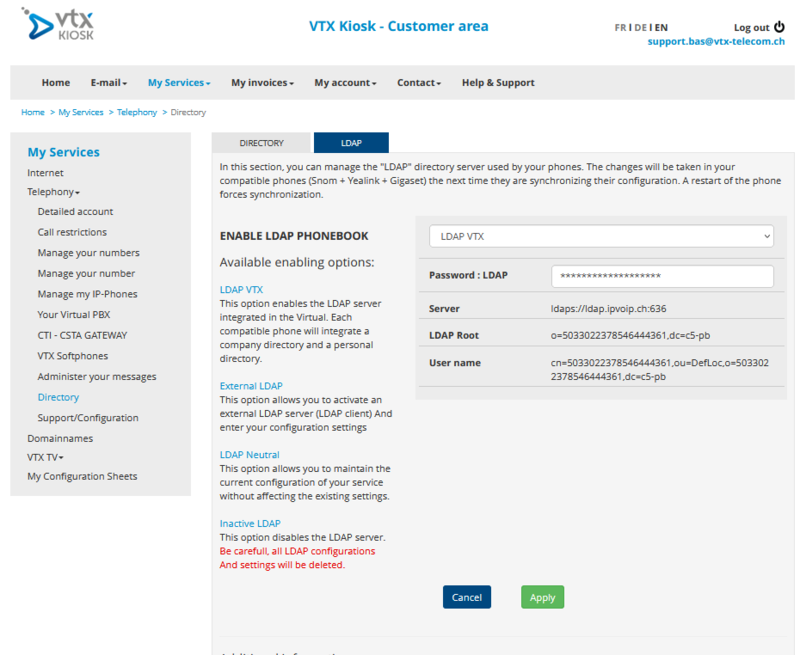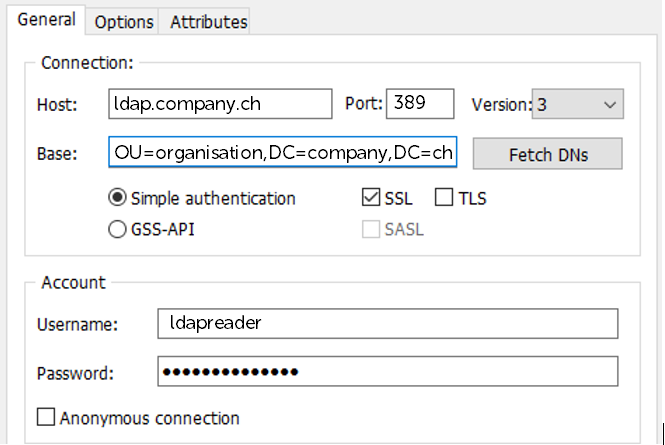VoIP:LDAP
From VTX Public Wiki
Introduction LDAP[edit | edit source]
We use LDAP to manage a centralized directory that will be automatically updated on on all compatible phones. You can manage it in the VTX-Kiosk.
| LDAP is not enabled by default and can only be used on all auto-provisioned phones, not on individual ones. |
Enable LDAP phonebook via Kiosk (autoprovisioning)[edit | edit source]
LDAP can be enabled via VTX-Kiosk, so you don't have to manually input the LDAP-credentials on compatible, auto-provisioned phones.
Go to the "Directory"-menu, under "My Services" and "Telephony", you can than choose the related phone-service and tap "show".
|
At this point you can choose how you want to enable LDAP (or disable) : |
LDAP VTX[edit | edit source]This option enables the LDAP server integrated in the Virtual PBX. Each compatible phone will integrate the company directory and the personal directory, managed via Kiosk. Please note that this works only with the LDAP VTX, if you want to use your own LDAP-server, it has to be set up seperately by using External LDAP
External LDAP[edit | edit source]This option allows you to activate an external LDAP server (LDAP client) and enter your configuration settings To be compatible with our LDAP, be sure to work with those parameters that are predevined:
Yealink ldap.display_name = %sn %givenName ldap.name_attr = sn givenName ldap.name_filter = (|(givenName=%)(sn=%)) ldap.numb_attr = telephoneNumber mobile homePhone ldap.number_filter = (|(telephoneNumber=%)(telephoneNumber=+%)(mobile=%)(mobile=+%)(homePhone=%)(homePhone=+%))
Snom ldap_display_name = %sn %givenName ldap_name_attributes = sn givenName ldap_number_attributes = telephoneNumber mobile homePhone ldap_number_filter = (|(telephoneNumber=%*)(telephoneNumber=+%*)(mobile=%*)(mobile=+%*)(homePhone=%*)(homePhone=+%*)) ldap_search_filter = (|(givenName=%*)(sn=%*))
Gigaset BS_LDAP_Netdirs.astNetdirProvider[0].DisplayName = %sn %givenName BS_LDAP_Netdirs.astNetdirProvider[0].NameAttributes = sn BS_LDAP_Netdirs.astNetdirProvider[0].NameFilter = (|(givenName=%)(sn=%)) BS_LDAP_Netdirs.astNetdirProvider[0].NumberAttributes = telephoneNumber BS_LDAP_Netdirs.astNetdirProvider[0].NumberFilter = (|(telephoneNumber=%)(telephoneNumber=+%)(mobile=%)(mobile=+%)) BS_LDAP_Netdirs.astNetdirProvider[0].astNetDirDirectoryItems[0].aucItemAttribute[0] = givenName BS_LDAP_Netdirs.astNetdirProvider[0].astNetDirDirectoryItems[1].aucItemAttribute[0] = sn BS_LDAP_Netdirs.astNetdirProvider[0].astNetDirDirectoryItems[2].aucItemAttribute[0] = homePhone BS_LDAP_Netdirs.astNetdirProvider[0].astNetDirDirectoryItems[3].aucItemAttribute[0] = telephoneNumber BS_LDAP_Netdirs.astNetdirProvider[0].astNetDirDirectoryItems[4].aucItemAttribute[0] = mobile BS_LDAP_Netdirs.astNetdirProvider[0].astNetDirDirectoryItems[6].aucItemAttribute[0] = facsimileTelephoneNumber
Server: ldap.company.ch Port: 389 LDAP Root: DC=ldap,DC=company,DC=ch User name: CN=ldapreader,OU=serviceuser,OU=organisation Password: ************ LDAP Root: usually the domain, could also be DC=domain,DC=local User name: never use an emailadresse like for example ldapreader@company.ch User name is built with a user in the ldap or active directory tree CN=ldapreader + usually OU=organisation, could also be CN=ldapreader,OU=organisation Easiest way is to use a openldap tool to get the authentification informations Base DN: dc=ldap,dc=company,dc=ch Bind DN: uid=root,ch=users,cd=office,dc=company,dc=ch ldapsearch -H [ldap://ldap.company.ch ldap://ldap.company.ch] -D "ldapreader" -w password -b "dc=company,dc=ch" "(CN=ldapreader)" | grep dn dn: CN=ldapreader,OU=serviceuser,OU=organisation,DC=company,DC=ch
LDAP Neutral[edit | edit source]This option allows you to maintain the current configuration of your service without affecting the existing settings.
Inactive LDAP[edit | edit source]This option disables the LDAP server. Be carefull, all LDAP configurations and settings will be deleted.
|
FAQ LDAP[edit | edit source]
Use same VTX LDAP Server on different vPBX services[edit | edit source]
You wish to have same LDAP informations on different vPBX within VTX.
- Activate VTX LDAP on one of the vPBX Services
- Get the credentials of the VTX LDAP activated on this Service
- Connect to the Kiosk of the other vPBX Services
- Activate External LDAP on all other vPBX Services and enter the credentials of first VTX LDAP (example below)
LDAP VTX (from main vPBX Service)
Password LDAP: ********************
Server: ldaps://ldap.ipvoip.ch:636
LDAP Root: o=7992737673434069316,dc=c5-pb
User name: cn=7992737673434069316,ou=DefLoc,o=7992737673434069316,dc=c5-pb
External LDAP (credentials above and how to insert for all other vPBX Services)
Protocol: LDAPS (Secure)
Server: ldap.ipvoip.ch
Port: 636
LDAP Root: o=5033022378546444361,dc=c5-pb
User name: cn=5033022378546444361,ou=DefLoc
Password: ********************
My "External LDAP" setting is not working[edit | edit source]
- Problem: You have setup a Kiosk LDAP External setup and it is not working
- Problematic: You need to identify where the problem comes from ( credentials, network, firewall, LDAP Tree, ...)
- Information: When "External LDAP" get setup in Kiosk, the only thing that VTX are doing is to push these parameters in the Yealink + Snom + Gigaset phones
- Clue: Most of the problems comes from: the LDAP suffix get added to the username, problem will be visible in Phone Web Interface LDAP setup
- Solution: Here is how to debug the problem
- Phone : Connect to a phone (Yealink or Snom or Gigaset) and do a LDAP config screenshot to see how it is setup
- In Kiosk : Set back LDAP setting to "LDAP Neutral" to allow you to perform LDAP setup modification on the phone (For Snom, you need to factory reset the phone)
- Phone : Now setup your LDAP settings manually on the phone and have it working, debug the problem on the Phone and on the server
- Network : Your phone need to be able to reach the LDAP server
- Credentials : You need to enter the correct credentials on the phone to have it working
- Phone : Once you have a working LDAP setup on the phone, compare it to the one that was pushed by the Kiosk and update the Kiosk setup to have it working



